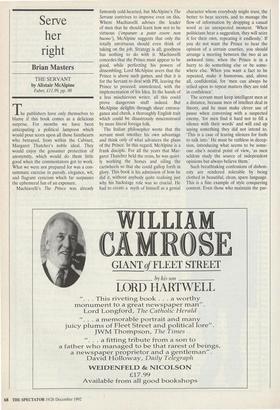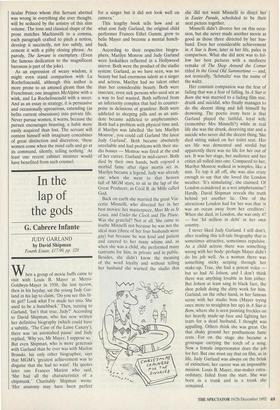Serve her right
Brian Masters
THE SERVANT by Alistair McAlpine Faber, £11.99, pp. 98 he publishers have only themselves to blame if this book comes as a delicious surprise. For months we have been anticipating a political lampoon which would pour scorn upon all those fainthearts who betrayed, from within the Cabinet, Margaret Thatcher's noble ideal. They would enjoy the gossamer protection of anonymity, which would do them little good when the commentators got to work. What we were not prepared for was a con- summate exercise in parody, elegance, wit, and flagrant cynicism which far surpasses the ephemeral fun of an exposure.
Machiavelli's The Prince was already famously cold-hearted, but McAlpine's The Servant contrives to improve even on this. Where Machiavelli advises the leader of men that he should learn how not to be virtuous ('imparare a poter essere non buono), McAlpine suggests that only the totally unvirtuous should even think of taking on the job. Strategy is all; goodness has nothing to do with it. Machiavelli concedes that the Prince must appear to be good, while perfecting his powers of dissembling; Lord McAlpine avers that the Prince is above such games, and that it is for the Servant to deal with PR, leaving the Prince to proceed, unmolested, with the implementation of his Idea. In the hands of a less mischievous writer, all this could prove dangerous stuff indeed. But McAlpine delights through sheer extrava- gance and cheek, a thoroughly English trait which could be disastrously misconstrued by more literal foreign folk.
The Italian philosopher wrote that the servant must smother his own advantage and think only of what advances the plans of the Prince. In this regard, McAlpine is a frank disciple. For all the years that Mar- garet Thatcher held the reins, he was quiet- ly working the horses and oiling the cartwheels so that she could gallop forth in glory. This book is his admission of how he did it, without anybody quite realising just why his backstage role was so crucial. He had to create a myth of himself as a genial character whom everybody might trust, the better to hear secrets, and to manage the flow of information by dropping a casual word at an unexpected moment. 'When politicians hear a suggestion, they will seize it for their own, repeating it endlessly.' If you do not want the Prince to hear the opinion of a certain courtier, you should arrange a meeting between the two at an awkward time, when the Prince is in a hurry to do something else or be some- where else. When you want a fact to be repeated, make it humorous, and, above all, confidential, for 'men can always be relied upon to repeat matters they are told in confidence'.
The servant must keep intelligent men at a distance, because men of intellect deal in theory, and he must make clever use of pause when conversing with a suspected enemy, 'for men find it hard not to fill a silence with their words' and will end up saying something they did not intend to. 'This is a case of leaving silences for fools to talk into.' He must be ruthless in decep- tion, introducing what seems to be some- one else's neutral point of view, 'as men seldom study the source of independent opinions but always believe them.'
Such breathtaking confessions of dishon- esty are rendered tolerable by being clothed in beautiful, clean, spare language. This is a fine example of style conquering content. Even those who maintain the par-
ticular Prince whom this Servant abetted was wrong in everything she ever thought, will be seduced by the artistry of this slim volume. The tone and classical shape of the prose matches Machiavelli to a comma, each paragraph crafted to pitch a notion, develop it succinctly, not too subtly, and cement it with a pithy closing phrase. As parody, The Servant is exemplary. (Even the famous dedication to the magnificent baroness is part of the joke).
As an expression of weary wisdom, it might even stand comparison with La Rochefoucauld, although this author is more prone to an amused gleam than the Frenchman; one imagines McAlpine with a wink, and La Rochefoucauld with a sneer. And as an essay in strategy, it is persuasive and occasionally uproarious, extending (as befits current obsessions) into private life. Never pursue women, it warns, because the pursuit encourages boasting, a habit more easily acquired than lost. The servant will content himself with imaginary concubines of great distinction and discretion; 'these women come when the mind calls and go at its command, silently, telling nothing.' At least one recent cabinet minister would have benefited from such counsel.











































































































 Previous page
Previous page